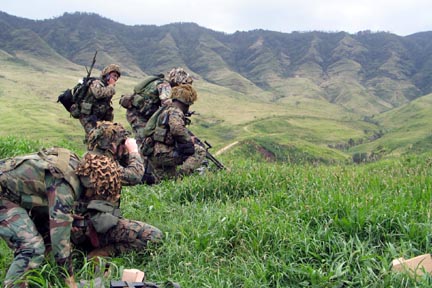
GREGG K. KAKESAKO / GKAKESAKO@STARBULLETIN.COM
Members of India Company provided supportive firepower yesterday as other Marines stormed a supposed terrorist camp in Makua Valley. The training was the first time in six years that a live-fire exercise was allowed in the valley.
Marines complete
exercise at MakuaThe live-fire training had to be
scaled back because of conditions
in a legal settlement
Kaneohe Marines completed a week-long live-fire exercise in Makua Valley yesterday under court-imposed guidelines that restricted the types of weapons used.
CORRECTION
Wednesday, April 14, 2003>> Isaac Moriwake is an attorney with the environmental group Earthjustice. His last name was misspelled as Moriwaki in a story on Page A5 Saturday.
The Honolulu Star-Bulletin strives to make its news report fair and accurate. If you have a question or comment about news coverage, call Editor Frank Bridgewater at 529-4791 or email him at fbridgewater@starbulletin.com.Capt. James Sweeney, commander of India Company of the 3rd Battalion, said originally he had wanted to train his company of 100 Marines in the 4,190-acre valley.
However, he was forced to amend his training plans after Malama Makua, a Leeward Oahu citizens group, filed a federal lawsuit March 15, claiming that Marines' operations violated a 2001 federal court settlement with the Army, which controls the firing range.
The lawsuit was dropped after the Army agreed to certain restrictions that reduced the number of mortar rounds to be fired and imposed conditions to allow the exercise only under certain environmental and weather conditions.
Sweeney said the operations were scaled back so that only one rifle platoon of 50 Marines, instead of a full company of 100, was allowed to fire ammunition.
"I had wanted to use three platoons, maneuvering through the valley, so they could learn to operate with each other," said Sweeney, a nine-year veteran.
Instead, only India Company's 2nd Platoon, led by 2nd Lt. Justin Bellman, made the assault on Makua Valley's trench system, which for the exercise was supposed to be a terrorist camp. Once in the trenches, the Marines, using ammunition and hand grenades, practiced clearing a room as they might be called upon to do in Iraq or Afghanistan.
Armed with their M-16 rifles and each carrying 30 pounds of equipment, Bellman's soldiers, consisting of three squads of 12 Marines, began the three-quarter-mile trek, stopping several times to react to pop-up targets.
"In the real world, the Marines would have attacked the terrorist camp after it had been bombarded by artillery and rockets and machine gun fire from attack Cobra helicopters and Harrier jets," said 1st Sgt. Gabriel Pintos.
Instead, the Marines had to rely yesterday on two 60 mm mortar tubes to provide the "suppression fire," designed to take out as much of the enemy as possible before the attack.
But the Marines, because of the March 31 court settlement, were restricted in the number of mortar rounds they could fire. Their original plan called for 110 mortar rounds, but that had to be cut back to 36.
During yesterday morning's exercise, a light rain fell intermittently, which the Marines welcomed since it lessen the possibility of fires -- one of the major issues raised by Malama Makua in its battle to rid the valley of the military.
The 70-minute operation was closely observed by members of Malama Makua. Isaac Moriwaki, an Earthjustice attorney who represents Malama Makua, said after the exercise that "there was some concern that some of the mortar rounds seemed to have fallen to the right of the impact area where there are cultural sites."
However, the Army later said that all of the mortar rounds fired by the Marines landed in the designated impact area.
Moriwaki said, "We're glad we were able to come up with something that protects the critical endangered species in the valley and provides for training."
Makua Valley is home to 45 species of endangered and threatened plants, as well as archaeological and historic sites.
Bellman, 25, said despite the restrictions, his platoon received "very realistic training."
"It meant that each squad had to learn to work with each other and while firing live ammunition," he said. "Makua is the only place on Oahu where this kind of training can take place."
